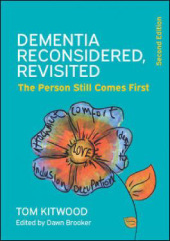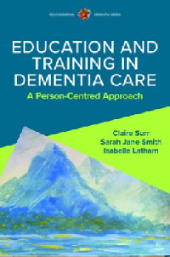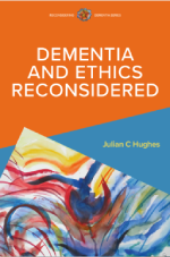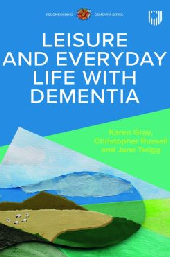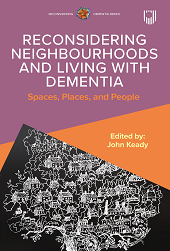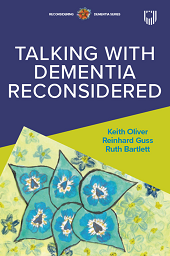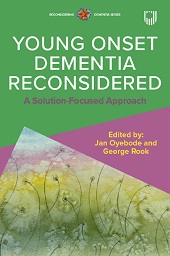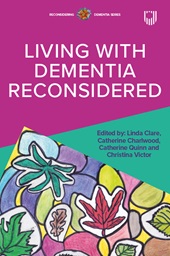Many thousands of people are diagnosed with dementia each year. Worldwide, the trend is that people are being diagnosed at much earlier stages. In addition, families and friends increasingly provide support to those affected by dementia over a prolonged period. Many people, both including those diagnosed with dementia and those who care for and support them, have an appetite to understand their condition.
The Reconsidering Dementia Series is an interdisciplinary collection published by Open University Press that covers contemporary issues to challenge and engage readers in thinking deeply about the topic. The dementia field has developed rapidly in its scope and practice over the past ten years and books in this series will unpack not only what this means for the student, academic and practitioner, but also for all those affected by dementia.
Dementia Reconsidered Revisited: The person still comes first
The original Dementia Reconsidered: The Person Comes First by Tom Kitwood was published by Open University Press in 1997.
The editor of this new edition, Dawn Brooker, was mentored by Tom Kitwood. She has drawn together a remarkable group of writers to provide a commentary on Kitwood’s work. This new edition reproduces the original chapters but provides extra content from subject experts to update the book to a contemporary level.
Key features include:
- On being a person
- Dementia as a psychiatric category
- How personhood is undermined
- Personhood maintained
- The experience of dementia
- Improving care: The next step forward
- The caring organization
- Requirements of a caregiver
- The task of cultural transformation
About the authors:
Professor Tom Kitwood
Professor Tom Kitwood’s seminal text Dementia Reconsidered published in 1997 which, at the time, revolutionised how dementia care was conceptualised. The book series editors worked together on the 2nd Edition of this book entitled Dementia Reconsidered Revisited: The person still comes first.
Professor Dawn Brooker
Dawn has been active in the field of dementia care since the 1980’s as a clinician and an academic. She draws on her experience and international networks to bring together a series of books on the most pertinent issues in the field.
Dementia and Psychotherapy Reconsidered
Dementia and Psychotherapy Reconsidered is intended not only for psychotherapists and counsellors, but for clinicians and families who want to find ways of talking about dementia with the people living with dementia that they care for.
There is little opportunity for people living with dementia to talk about their experiences and what is happening to them. This often makes it harder for them to adjust to, and to accept, the diagnosis. Dementia and Psychotherapy Reconsidered introduces a new and distinctive way of helping people to talk about their dementia. Each of the four sections is augmented with examples from the author’s 30 years of clinical and research experience and offers an accessible approach from mainstream psychotherapeutic and psychological frameworks.
Key features include:
- Emphasising the importance of psychological processes such as loss and threat in the lives of people living with dementia
- Setting out a model of adjustment to dementia and outlining how talking about dementia needs to be tailored to the stage of change
- Outlining the research and clinical evidence underpinning psychotherapy, whether this is delivered to individuals, couples or to groups
- Showing how psychotherapy and counselling can be adapted to accommodate the client’s cognitive changes
About the author:
Professor Richard Cheston
Richard Cheston worked as a Clinical Psychologist in the NHS before becoming Professor of Dementia Research at the University of the West of England, UK in 2012.
Education and Training in Dementia Care: A Person-Centred Approach
In the last twenty years, the evidence-base for how to provide person-centred care for people with dementia has grown significantly. Despite this, until recently there has been little evidence as to how to provide training and education for the dementia workforce.
This book provides an evidence-based, practical resource for people intending to develop, deliver, review, or commission education and training for the dementia workforce.
Throughout the book:
- Considers the importance of informal routes and mechanisms for
workforce development - Examines the importance of context and setting conditions for
successful implementation of training at individual, service and
organisational level - Contains up-to-date international research evidence, case studies
and vignettes
About the authors:
Claire Surr
Claire is Professor of Dementia Studies and Director of the Centre for Dementia Research at Leeds Beckett University, UK.
Sarah Jane Smith
Sarah Jane is a Reader in Dementia Research at Leeds Beckett University, UK.
Isabelle Latham
Isabelle is Researcher-in-Residence for Hallmark Care Homes, UK and Honorary Senior Research Fellow for the Association for Dementia
Studies at the University of Worcester, UK.
Dementia and Ethics Reconsidered
Ethical issues are involved in every decision that is made in connection with someone living with dementia – from decisions about care and treatment to decisions about research and funding.
This book encourages the reader to reconsider ethics in dementia care with the use of ‘patterns of practice’, an innovative idea developed by the author. The book highlights the importance of understanding the person’s narrative, of good communication, high quality care, and expert interpretation of the meaning of situations for people living with dementia.
This book:
- Reviews ethical theories and approaches in connection with dementia care
- Considers issues such as such as stigma, quality of life, personhood, and citizenship in relation to dementia
- Looks at issues relevant to research ethics
- Presents case vignettes to highlight a complete spectrum of ethical issues that arise in dementia care
- Is accessibly written for multiple audiences – from people living with dementia to practitioners
About the author:
Julian C. Hughes
Julian C. Hughes was a consultant in old age psychiatry. Having trained in both philosophy and medicine, he was appointed honorary professor of philosophy of ageing at Newcastle University, UK and subsequently professor of old age psychiatry at the University of Bristol, UK. He was deputy chair of the Nuffield Council on Bioethics, UK.
Leisure and Everyday Life with Dementia
This edited book will examine leisure in the lives of people with dementia, emphasising the active role people with dementia can play as citizens in contributing to the world in which they live, given opportunities to make choices about their participation in it.
This book will explore:
- The individual, interactions and relationships
- Time – how it is used and by whom
- Place, places and spaces – their nature, use and meaning
About the editors:
Dr Karen Gray
Dr Karen Gray is a researcher at the University of Bristol, UK. She has wide-ranging experience in researching and evaluating engagement in arts and creative activity for health and wellbeing.
Dr Chris Russell
Dr Chris Russell is Senior Lecturer with the Association for Dementia Studies at the University of Worcester, UK, where he is Programme Lead for the Post Graduate Certificate in Dementia Studies.
Jane Twigg
Jane Twigg has a background as a physiotherapist. This was before caring for her mom, who had dementia, including supporting Mom to continue to live in the world. Jane is now living with atypical dementia. She has a passion for life. Long distance walking brings her most joy, giving her a sense of achievement and wellbeing.
Reconsidering Neighbourhoods and Living with Dementia: Spaces, Places, and People
This book brings together the key findings of all eight work programmes that made up the ESRC/NIHR Neighbourhoods and Dementia study that was concerned with better understanding how people with dementia navigated and interacted with their neighbourhood on an everyday basis.
This book will explore:
- The Lived Neighbourhood
- Neighbourhoods, Measurement and Technology
- Neighbourhoods and Big Data
- Personal Well-Being and Neighbourhood Programme Support
- Bringing it Together and Future Directions
About the editor:
John Keady
John Keady is a mental health nurse who has been involved in dementia care for over 30 years. Since 2006, he has held a joint appointment between the University of Manchester and the Greater Manchester Mental Health NHS Foundation Trust. He was the Chief Investigator of the Neighbourhoods study.
Talking with Dementia Reconsidered
This book places people living with a diagnosis of dementia at its core, providing each person with the opportunity to express themselves whilst viewing their lives in relation to the Kitwood flower model.
Authored by a person living with dementia, an experienced consultant clinical psychologist and a
respected academic, the three combine to amplify and showcase the words of the Fifteen people
living with dementia, in an original, authentic and unique way. This book:
- Gives readers transparent insight into the lives, hopes and fears of a diverse range of people living with various forms of dementia
- Shows how each petal of the Kitwood flower with love at its centre is a helpful framework for each person to describe their life
- Links the interviews with issues, frameworks, policy and practice
- Examines what stakeholders can take from this book to advance dementia care
About the authors:
Dr Keith Oliver
Keith voluntarily works hard for charities and the NHS. He retired from being a head teacher when diagnosed with Alzheimer’s at age 55. Keith is Series editor for the Reconsidering Dementia Series.
Reinhard Guss
Reinhard is a Consultant Clinical Psychologist and Clinical Neuropsychologist with over thirty years’ experience working in the fi eld of dementia in the UK National Health Service.
Dr Ruth Bartlett
Ruth is Associate Professor at the University of Southampton, UK, co-director of the University’s Doctoral Training Centre in Dementia Care and Principal Investigator of an interdisciplinary, cross-faculty research project funded by the Alzheimer’s Society.
Young Onset Dementia Reconsidered: A Solution-Focused Approach
This solution-focused book, authored by leading experts from the UK, Canada, Norway and the Netherlands, delves into the many areas of life affected by dementia. When dementia occurs under 65 there are unique challenges and the impact on life is very different from diagnosis at a later age. The authors synthesise research to provide practical advice and information on living well, as well as the types of support available to those living with young onset dementia and their families.
Young Onset Dementia Reconsidered is accessibly written and split into three sections to reflect key outcomes important to people living with young onset dementia: to maintain control over their own lives, to retain a sense of identity and to feel connected with others.
This Book:
- Began from conversations with people living with young onset dementia and amplifies their voices throughout
- Contains coverage of a breadth of areas, including the social, psychological, employment, financial, legal and creative, as well as health and symptom-related aspects
- Is grounded in evidence and research and takes a solution-focused approach.
About the authors:
Jan Oyebode
Jan is Professor of Dementia Care at the Centre for Applied Dementia Studies, University of Bradford, UK where her current research focuses on how to provide better support for people with young onset dementia. She is also a member of the Young Dementia Network Steering Group.
George Rook
George has worked as an accountant, English teacher and school business manager. He was diagnosed with young onset dementia aged 62, and has since then been increasingly involved in activism, speaking and blogging about living with dementia. He is now also engaged in research projects. George learned to paint during Covid and gets huge satisfaction from it.
Dr Ruth Bartlett
Ruth is Associate Professor at the University of Southampton, UK, co-director of the University’s Doctoral Training Centre in Dementia Care and Principal Investigator of an interdisciplinary, cross-faculty research project funded by the Alzheimer’s Society.
Living with Dementia Reconsidered
Drawing on a decade of rigourous research and with the direct input of people with dementia and their carers, this book unveils the findings from IDEAL (Improving the Experience of Dementia and Enhancing Active Life), the largest community-based dementia study in Great Britain, highlighting critical factors that significantly influence quality of life for both individuals with dementia and their carers. Gain first-hand insights from those living with dementia and the research team, exploring how different aspects of our lives intertwine to indluence feelings of contentment and inclusion, or distress and exclusion. Each chapter culminates in a robust, evidence-based statement, building towards a compelling manifesto that advocates for a paradigm shift in how we understand and support people living with dementia and their carers.
This Book:
- Is uniquely co-produced with experts by experience.
- Is centred around a ten-point manifesto which is call for action to improve the lives of people living with dementia.
- Draws on the evidence of a ten-year research programme and over eighty scientific papers.
About the authors:
Linda Clare
Linda is Professor of Clinical Psychology of Ageing and Dementia at the University of Exeter Medical School, UK. She directs the National Institute for Health and Care Research (NIHR) Policy Research Unit in Dementia and Neurodegeneration, University of Exeter and serves as dementia theme lead for the NIHR Applied Research Collaboration South-West Peninsula.
Catherine Charlwood
Catherine Charlwood was the Research Translation and Impact Manager on the IDEAL programme from 2021, and now works as Stakeholder Engagement and Impact Manager for the NIHR Policy Research Unit in Dementia and Neurodegeneration, University of Exeter.
Catherine Quinn
Catherine Quinn is Associate Professor at the Centre for Applied Dementia Studies at the University of Bradford. She leads a module on post-diagnostic support and living well with dementia on the MSc in Advanced Dementia Studies.
Christina Victor
Christina Victor is Professor of Gerontology and Public Health in the College of Health, Medicine and Life Sciences at Brunel University London, Associate PVC for Research Culture and Governance, and Director of the University’s Institute of Health, Medicine and Environments.
The covers have all been designed by people living with dementia: Cheston: Keith Oliver, Surr: Keith Oliver, Hughes: George Rook, Keady: Frances Isaacs, Oliver et al: Keith Oliver, Gray et al: Jane Twigg, Oyebode & Rook: Gail Gregory, Clare et al: Jacqui Bingham and Julia Burton
Praise for the series
View our webinar: Talking with Dementia, Reconsidered: A Journey of Collaboration and Innovation in Dementia Care
Discover:
- Behind-the-scenes insights: Learn about the collaborative process that led to the creation of this landmark resource in the field of Dementia context of the Reconsidering Dementia Series.
- Expert perspectives: Hear from Dr. Keith Oliver, a leading advocate for dementia living with the condition, and Reinhard Gus, a renowned clinical psychologist.
- Firsthand accounts: Gain insights from individuals living with dementia.
- Best practices: Discover practical strategies for improving dementia care.
- This webinar offers a unique opportunity to learn from experts and gain a deeper understanding of dementia care.
Interested in using these titles?
If you are interested in using these titles on your course, contact our Marketing team at:

